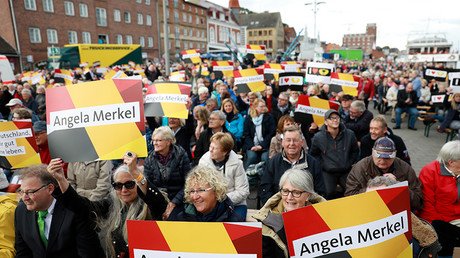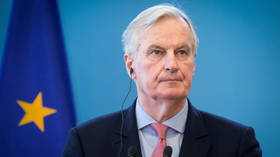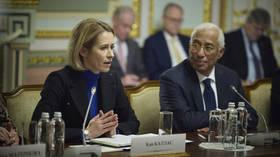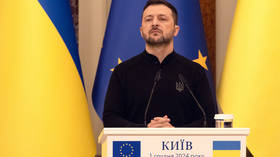German elites prepare Russian hacking claim in case elections don't go their way - ex-MI5 officer
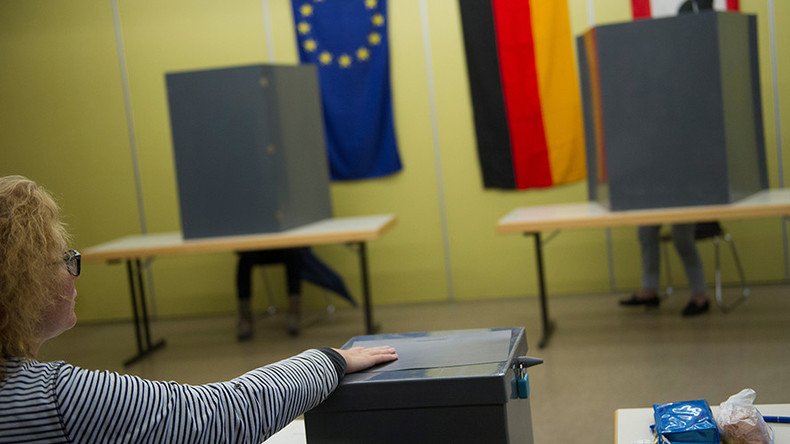
The German national character is risk-averse: stability, prosperity and security tend to be the things Germans would vote for. And if Merkel is perceived to deliver them, she will remain in power, says former MI5 intelligence officer Annie Machon.
While Germans are casting their votes for members of parliament, who will occupy at least 598 seats in the Bundestag for the next four years, Chancellor Angela Merkel and her ruling Christian Democrat/Christian Social Union alliance are favored to win the German parliamentary elections.
RT spoke to former UK intelligence officer Machon to discuss this issue.
RT: There was much scare-mongering about possible Russian meddling in the German election, of which not a trace has been detected. Why was this made a big issue?
Annie Machon: I am not at all surprised that Russia is being accused yet again of trying to hack or interfere in an election in a Western country. It seems to be a sort of fashion of this year and last year. I think it is interesting, though, every time the elites of whichever country feels that there might be some sort of populist revolt or vote against what the elites think they should be voting for, they almost pro-actively say, ‘There must be Russia interfering in these elections’ because they might get the result they don’t want. But it is crazy because we have seen time and again, there is no evidence of Russian hacking. There were assertions about Brexit, there were assertions in France. Emmanuel Macron during the election said, ‘We’ve been hacked.’ And then the French intelligence agencies went off to investigate and said, ‘There is no evidence of hacking.’ Similarly, we’ve seen Merkel in the run-up to the federal election saying, ‘They are going to hack German elections, too.’ So, she sent off the BND and BFV to investigate and they came back saying, ‘There is absolutely no evidence of Russian hacking.’ Merkel wanted a different result and told them to go and find different information. This is how crazy it is getting. As soon as any powers in any Western country think, ‘Actually, we might not get a result we want, let’s blame the Russians.’ And they are doing that preemptively now as well. It is ridiculous.
Who’s who: Federal election kicks off in Germany https://t.co/vpjT2Sahio#GermanyDecidespic.twitter.com/GR6nYYDeFX
— RT (@RT_com) September 24, 2017
RT: Merkel is on the way to securing her fourth term despite the migrant crisis and Germany’s spate of terrorist attacks. What makes her so resilient?
AM: I would put that down to the case of German national character being fairly risk-averse. Some of the vox pops that I heard seem to indicate that actually ‘change is a risk’ and it would be ‘good not to have change.’ Stability, prosperity and security tend to be the things they would vote for, and if she is perceived to deliver them, then she will remain in power.
I would suggest that security is a slightly tricky issue for her at the moment. Because not only have we had a whole range of increased and diverse terrorist-type attacks in Germany over the last couple of years, but also don’t forget, only four years ago, we had the Snowden disclosures, which, on the opposite side of security showed how the German intelligence agencies were complicit with breaking the German constitution in order to support and aid the American intelligence agencies, which caused a massive scandal back then. And I think that is going to feed into some support for other fringe parties, most notably the Pirate Party, which advocates privacy and internet freedoms.
RT: Merkel’s main rival is Martin Schulz, whose party has also been the CDU's junior partner, which seems to tie his hands in terms of his ability to criticize her. Has he managed to present himself as a clear alternative?
AM: I don’t think there is a clear divide between the two of them. He was obviously the favorite contender when he put his hat into the ring to succeed Merkel, to have a chance of toppling her. But I don’t think he will at this stage.
I think the position of Germany will not change a lot, unfortunately. All the other Europeans are waiting for the change, are expecting something new. I don’t expect any revolution from this election. I think it will go on with the same thing, the same ideas. Change can be brought by the increase of the AfD (Alternative for Germany). I am sure they will probably reach 12-15 percent. In that sense, it is a change. But the main politics will not change because if you see the campaign – you have the same parties, you have the same ideas, you have the same people as usual. And these people will stay after the elections as the usual leaders of Germany. Even if the AfD is growing, it will not be able to change the balance of the German political powers. - Guy Mettan, executive director of Swiss press club
RT: The main intrigue is which party will finish third; the polls are giving the AfD high chances. Do you think they could go as far as getting double digits?
AM: I think the polls are indicating they have a very good chance. And also, when you are doing polling on those sorts of parties, you tend to get the sort of shy voter not really disclosing that they intend to vote for a party that is seen to be slightly unacceptable socially. I think they may well end up with more votes than is currently being polled. And this is a knee-jerk reaction to the immigration issue. Most people would applaud the humanitarian reason behind Merkel’s intervention and inviting all the immigrants in, as well as her pragmatic approach in saying: ‘We are an aging population, we need some new young workers coming into our country.’ It has caused discontent, it has caused resentment. Most notably in what used to be Eastern Germany. Because whether it is true or not, there have been a number of commentaries and a number of headlines saying that East Germans, the Ostees, felt that they weren’t integrated successfully when Germany was reunified 27 years ago. They feel resentment that actually so much effort is being put into integrating the new immigrants. Whether that is true or not, or it is just a perception, it could be very damaging to Merkel.
